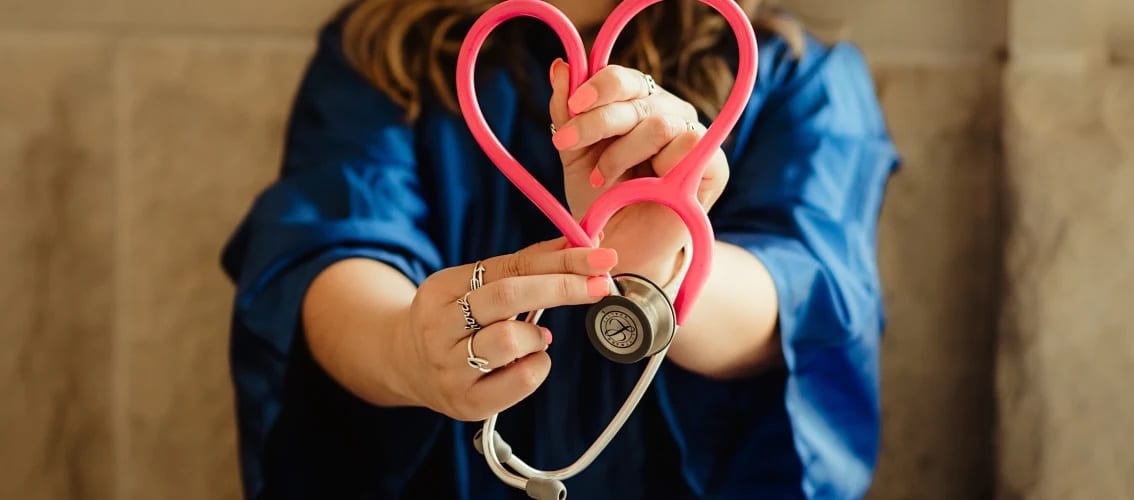Social Media for Doctors: What do you think?
TikTok is an exciting, fun app that allows people to communicate any and all kinds of content in new and interesting ways. From funny videos to recipes and even medical advice, TikTok has it all.
Today, TikTok has roughly 1 billion monthly active global users.
The app provides users an incredibly easy way to view, create, and share content. The short videos produced for the app cater to viewers’ ever-shortening attention spans, encouraging them to loop through hundreds of videos in no time at all. The process, while fun and entertaining, is highly addictive.
With its large consumer audiences, easy video creation, and viral popularity, it’s no surprise that doctors, nurses, and other healthcare professionals are jumping on board. But is that a good thing? Recently, several medical professionals have come under scrutiny and faced backlash for posting healthcare-related content. At the same time, others have been lauded for their contributions to social media sites. There are clearly very mixed feelings about this topic.
Let’s take a look at some of the pros and cons of medical professionals on TikTok to get a better understanding of this issue.
The Pros of Social Media for Doctors
As with most things in life, there are good aspects and bad aspects to social media for doctors. Let’s start with the good.
A Chance to Educate
Because of their professions, doctors, nurses, and others who work in healthcare are uniquely empowered to educate people about illnesses, screenings, general health, and much more. They actively strive in their day-to-day work to engage with patients about medical issues that may otherwise go unaddressed. But the number of people a doctor or nurse can help educate in their offices during the work day can’t begin to compare to the number of people they can reach on TikTok with a single educational video.
People like Dr. Staci Tanouye (@dr.staci.t) and Dr. Michael Varshavski (@doctormike) use their platforms on TikTok to dispel medical myths and talk to their followers about cancer screenings, vaccines, and much more. Across their social media and YouTube accounts, Tanouye and Varshavski reach more than seven million people with their content — a feat that would be impossible without platforms like TikTok.
Medical Misinformation, Corrected
Billions of people around the world have access to the internet at the touch of their fingertips, allowing information to be created and spread at an incredibly fast pace. But not all of the information shared is trustworthy — especially in the field of medicine.
Countless accounts across all kinds of social media platforms from Facebook to Instagram and even TikTok spread inaccurate information about diseases, health and wellness tips, and, more recently, COVID-19. Healthcare professionals have the ability to correct this kind of misinformation because they can identify the bad advice or incorrect information and show audiences what the truth is.
Nurse practitioner Christina Kim uses her TikTok account to do just that. She noticed a trend online of videos proclaiming false information about COVID-19, and decided to take action. In July, Kim posted a video where she wore a surgical mask, a thicker mask, an N95 mask, and then all of them at once while she was hooked up to a pulse oximeter to prove that wearing a mask doesn’t affect oxygenation or cause “carbon dioxide poisoning.”
Her video was viewed more than one and a half million times and grew her a TikTok following of more than 50,000, allowing her to further counter medical misinformation to a large audience that she wouldn’t have otherwise been able to reach.
Social Media for Doctors Makes Medicine more Accessible
Because TikTok is quite literally the tap of a finger away, it empowers content and its creators to feel closer than ever. This extends to doctors, nurses, and other healthcare professionals.
Through TikTok, viewers are able to easily engage with content creators by sharing, liking, and commenting on their videos. Many times, these creators will respond, promoting a sense of community on their pages that encourages viewers to revisit their content time and time again.
Medical professionals can use social media for doctors in that way to create community, but also to let viewers know that doctors, nurses, and everyone else in the healthcare profession are real people, too. They can goof off, joke around, share their cute pets, and make interesting content that shows they are more than their chosen career, encouraging people to view their own healthcare workers in a more realistic manner.
The Cons of Social Media for Doctors
Now let’s move on to the not-so-great side of social media for doctors.
Doctor/ patient confidentiality?
Anyone who has an online presence runs the risk of inadvertently exposing personal or professional secrets to the public. Healthcare professionals are no exception to this rule. For most TikTok users, accidentally exposing these secrets can be a source of great embarrassment, but not much else.
For healthcare professionals, intentionally or accidentally exposing secrets can have much greater consequences than a little embarrassment. It can lead to breaches in doctor/patient confidentiality which can negatively impact the patient’s privacy, the doctor’s job, and public trust in healthcare professionals.
Every job has the potential to bring about entertaining events that are a lot of fun to reenact and retell later for the amusement of family, friends, and followers on social media platforms like TikTok.
Whenever doctors share patient stories, they have to take extra care not to divulge too much information.
Ill-advised Jokes
As a healthcare professional, you uniquely have both the authority and ability to speak out about healthcare and medical issues on social media outlets like TikTok. But, as Uncle Ben immortally warned, “with great power comes great responsibility.”
It can be really easy for doctors, nurses, and others in medicine to joke around with patients or colleagues in the moment about more sensitive issues if they’ve read the room and know that their joke will be received well. And if it’s not, then they can apologize to those present and move on.
It’s an entirely different beast to try and convey that same punchline to the potential millions of viewers on TikTok. Online, healthcare professionals can’t read the room or control how their video is received which can lead to viewers feeling like the video is insensitive and unprofessional. Or worse: that the video mocks patients.
Additionally, if the content isn’t received well, it’s virtually impossible to apologize to everyone who saw it because there is no way to ensure all the original viewers will even see the apology message.
Key takeaways
TikTok can be used either to engage or alienate the public. Now, more than ever before, the public needs good doctors, nurses, and other healthcare professionals filling their screens with accurate information that promotes appropriate action and conversation by disproving misinformation about COVID-19 or other medical issues that may not be considered or addressed otherwise.
Overall, TikTok has great potential for connecting the public with medical professionals in a way that promotes medicine and the healthcare community, but there are still several grey areas and drawbacks to using the app that need to be carefully considered before you post your first video.

